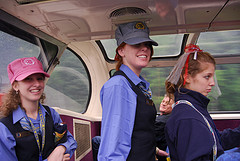
We recently received several questions, all focusing around one issue: gaining experience. Though we’ve detailed the concept of transferable skills, I thought it best to ask one of our writers, Brandon, to handle this one directly. On this note, keep sending in your questions and we’ll keep forging new ground.
“How do I get work experience?”
This often asked inquiry is usually penned by eager-eyed graduates throwing their brand new diplomas at places of employment, hoping it will stick. Generally, the question sounds something like this, “How can I ever get work experience if they won’t give me a chance to work?!”
This problem is almost always blown out of proportion due to a flawed belief that many hold, that one can only gain work experience from working a job. For those possessing such a negative attitude (and yes, attitude plays a huge role in gaining employment—at any level) think about this: we would never have an eligible President of the United States seeing that no candidates have any prior experience running a country.
The solution to not having any (or enough) experience is something we in the business call transferable value. You see, the skills that are required in the work place (let’s call them transferable skills) can be learned in a multitude of venues and locations. For instance, a recent graduate may cite his courses as experience, especially if they were hands-on courses requiring students to complete said task. Perhaps it’s been a while since you’ve graduated and are looking for a change in career; the same applies to you as well.
Career tip 1: Transferable skills are learned throughout your education and career that may count as relative work experience.
You’re now probably wondering, “How do I know what counts as experience and what doesn’t?” That’s up for you to decide. Only you can judge what is relevant and what isn’t. Just remember to think outside of the box when you start to get introspective. For example, a waitress at Denny’s has far more transferable value than one may think.
Any waitress or server will tell you in a heartbeat they have the ability to multi-task, are proficient in customer service, and have experience handling money. Do you see where this is going?
Career tip 2: While evaluating your transferable skills, don’t stop at the basic job posting requirements.
There’s a little thing called “added value” which plays directly into the above career tip. Added value is that something extra you bring that most other candidates do not. For instance, let’s say you are bilingual yet the job does not require you to be. The benefit of being bilingual could be to your advantage. Think about it, if the company wants to expand to a new audience, you may fit perfectly into their future plans. Another example of an added value may be a proficiency in software or hardware.
Still think you don’t have any experience? Think again!
Delve deeply into your creative side and begin considering the many transferable skills you offer. There are skills you’ve learned that count as work experience. There are also additional unique added-value skills you’ve learned that sets you apart from the competition. Don’t overlook the significance of your past as you build your future.
If you would like additional information about developing an introductory letter or assistance in any other career-related manner, don’t hesitate to reach out and send your request through the comment section or email us directly at [email protected] or you can even visit us at Amazon.com (search Huffman at ecs).
Written by Brandon Hayhurst
www.educationcareerservices.com
Twitter: @dannyatecs


